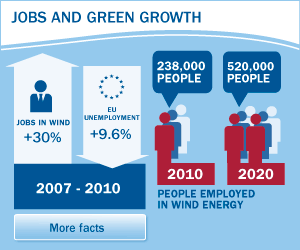The “dash for gas” not wanted by wind turbine-supporting public
 A new UK-wide poll indicating that more than two-thirds of respondents would favour a community-owned wind turbine close to their home rather than a shale gas well is bound to raise questions about Chancellor George Osborne’s proposed “dash for gas.”
A new UK-wide poll indicating that more than two-thirds of respondents would favour a community-owned wind turbine close to their home rather than a shale gas well is bound to raise questions about Chancellor George Osborne’s proposed “dash for gas.”
The Guardian reported Tuesday that the poll, conducted by ICM Survey, shows only coal and nuclear are less popular that shale gas.
When asked to choose between having the two energy sources within two miles of their home, the Guardian noted, 67% of respondents favoured a turbine, compared to just 11% who would support the gas development.
The poll showed 49% of people would support a wind turbine within two miles of their home, with 22% against, the newspaper said, adding that if the project were community-owned, support rose to 68% and opposition plummeted to 7%.
“This poll puts to the sword the myth that the public are set against onshore wind and wish to rush into a second dash for gas,” the Guardian quoted Paul Monaghan, head of social goals at the Co-operative, which commissioned the ICM poll for the launch of the Co-op’s Manifesto for a community energy revolution which it is backing with £100m of investment, as saying.
The newspaper also noted that another recent poll, by YouGov, showed that 55% of people want more wind farms, compared to just 17% who want more gas power stations. It also showed that less than one in three people thinks the government should give the go-ahead to fracking.
In a twist to the tale of support for renewables, the BBC this week reported that some people in Wales are feeling threatened if they support wind power development. The BBC spoke to several farmers and members of communities who said that the actions of protesters make them feel intimidated and afraid to attend meetings to voice their support for wind farms publicly.
“We’re scared to support any kind of alternative energy openly. I had a terrible experience at a public meeting,” former head teacher Buddug Bates, a supporter of wind energy near Llanfaircaereinion, was quoted as saying.
Wind power can drive down electricity prices
Earlier this week, The Financial Times published an article acknowledging that as wind power and other renewables continue to develop they have the ability to reduce the wholesale price of electricity.
“For anyone rendered slack-jawed by the latest monthly power bill, this might sound like good news,” the FT reported. Curiously, the article did not necessarily present falling electricity prices due to renewables as a good thing; “especially for companies that derive a lot of profits from generating power via conventional fossil fuels such as coal or gas.”
Some utilities risk having as much as half their power generation profits wiped out by 2020 as renewables reshape energy markets, the story said, adding that increasingly so much renewable power is available at certain times of the day that it meets a sizeable chunk of demand. Market prices can plummet because renewables have low operation costs and free fuel, unlike fossil fuels, the story said.
The European Wind Energy Association (EWEA) has long held the view that wind power can help drive down electricity prices. An EWEA report — Wind Energy and Electricity Prices —published in 2010 showed that increased penetration of wind power has the potential of reducing wholesale spot prices while lowering consumer costs. EWEA will not apologise for wind power’s potential to reduce electricity prices, even if the FT article implies that lower prices are bad!






